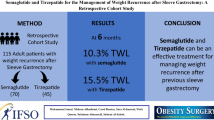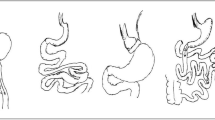Abstract
Background
Gastric bypass is the bariatric surgery most frequently performed in the world. It is responsible for sustainable weight loss, resolution of comorbidities, and improvement of quality of life. However, weight loss is not homogeneous, at times being insufficient in some patients. Our objective was to assess which factors were important in influencing this differentiated weight loss over a period of 4 years after surgery.
Methods
In this retrospective study, we assessed several physical, socioeconomic, behavioral, surgical, and demographic factors in morbidly obese patients submitted to Roux-en-Y gastric bypass that might influence excess weight loss over a period of 4 years after surgery. The same factors were assessed in order to characterize insufficient excess weight loss (<50% EWL).
Results
Review of the medical records of 149 patients showed that type-2 diabetes mellitus and dyslipidemia were the most important factors related to a lower EWL up to the third year. Preoperative weight loss, lower schooling, and lack of adherence to nutritional guidelines were important after 2 and 3 years. The presence of depression and lack of adherence to nutritional guidelines were the factors related to EWL of less than 50%.
Conclusions
Special attention and clarification should be provided to patients with diabetes mellitus type 2 and dyslipidemia and to patients with depression and lower schooling, since these patients tend to lose less excess weight after surgery. Multiprofessional care should also be provided so that the patients will follow nutritional guidelines more rigorously after surgery.
Similar content being viewed by others
References
Sjöström L, Lindroos AK, Peltonen M, et al. Lifestyle, diabetes, and cardiovascular risk factors 10 years after bariatric surgery. N Engl J Med. 2004;351(26):2683–93.
Buchwald H, Avidor Y, Braunwald E, et al. Bariatric surgery: a systematic review and meta-analysis. JAMA. 2004;292:1724–37.
Korenkov M, Sauerland S. Clinical update: bariatric surgery. Lancet. 2007;370:1988–90.
Ali MR, Fuller WD, Choi MP, et al. Bariatric surgical outcomes. Surg Clin North Am. 2005;85:835–52.
Salem L, Jensen CC, Flum DR. Are bariatric surgical outcomes worth their cost? A systematic review. J Am Coll Surg. 2005;200:270–8.
Nguyen NT, Goldman C, Rosenquist CJ, et al. Laparoscopic versus open gastric bypass: a randomized study of outcomes, quality of life, and costs. Ann Surg. 2001;234(3):279–91.
Pories WJ, Swanson MS, MacDonald KG, et al. Who would have thought it? An operation proves to be the most effective therapy for adult-onset diabetes mellitus. Ann Surg. 1995;222:339–50.
Christou NV, Look D, MacLean LD. Weight gain after short- and long-limb gastric bypass in patients followed for longer than 10 years. Ann Surg. 2006;244:734–40.
Elfhag K, Rössner S. Who succeeds in maintaining weight loss? A conceptual review of factors associated with weight loss maintenance and weight regain. Obesity reviews. 2005;6:67–85.
Ciovica R, Takata M, Vittinghoff E. The Impact of Roux Limb Length on Weight Loss After Gastric Bypass Obes Surg. 2008;18:5–10.
Campos GM, Rabl C, Mulligan K, et al. Factors associated with weight loss after gastric bypass. Arch Surg. 2008;143:877–84.
Carbonell AM, Wolfe LG, Meador RN, et al. Does diabetes affect weight loss after gastric bypass? Surg Obes Relat Dis. 2008;4:441–4.
Roberts K, Duffy A, Kaufman J, et al. Size matters: gastric pouch size correlates with weight loss after laparoscopic Roux-en-Y gastric bypass. Surg Endosc. 2007;21:1397–402.
Lutfi R, Torquati A, Sekhar N, et al. Predictors of success after laparoscopic gastric bypass: a multivariate analysis of socioeconomic factors. Surg Endosc. 2006;20:864–7.
Ray EC, Nickels MW, Sayeed S, et al. Predicting success after gastric bypass: the role of psychosocial and behavioral factors. Surgery. 2003;134:555–63.
Perugini RA, Mason R, Czerniach DR, et al. Predictors of complication and suboptimal weight loss after laparoscopic Roux-en-Y gastric bypass. Arch Surg. 2003;138:541–6.
Kadera BE, Lum K, Grant J. Remission of type 2 diabetes after Roux-en-Y gastric bypass is associated with greater weight loss. Surg Obes Relat Dis. 2009;5:305–9.
Melton GB, Steele KE, Schweitzer MA, et al. Suboptimal weight loss after gastric bypass surgery: correlation of demographics, comorbidities and insurance status with outcomes. J Gastrointest Surg. 2008;12:250–5.
Luis DA, Aller R, Sagrado MG, et al. Influence of Lys656asn polymorphism of leptin receptor gene on surgical results of biliopancreatic diversion. J Gastrointest Surg. 2010;14:899–903.
Thonney B, Pataky Z, Badel S, et al. The relationship between weight loss and psychosocial functioning among bariatric surgery patients. Am J Surg. 2010;199:183–8.
Livhits M, Mercado C, Yermilov I, et al. Does weight loss immediately before bariatric surgery improve outcomes: a systematic review. Surg Obes Relat Dis. 2009;5:713–21.
NIH. Gastrointestinal surgery for severe obesity: Consensus Development Conference Panel. Ann Intern Med. 1991;115:956–61.
Ma Y, Pagoto SL, Olendzki BC, et al. Predictors of weight status following laparoscopic gastric bypass. Obes Surg. 2006;16:1227–31.
Wittgrove AC, Clark GW. Laparoscopic gastric bypass, Roux-en-Y – 500 patients: technique and results, with 3–60 month follow-up. Obes Surg. 2000;10:233–9.
Flier J, Maratos-Flier E. Energy homeostasis and body weight. Curr Biol. 2000;10:R215–7.
Kahn BB, Flier JS. Obesity and insulin resistance. J Clin Invest. 2000;106:473–81.
Prospective UK. Diabetes Study (UKPDS) Group. Intensive blood-glucose control with sulphonylureas or insulin compared with conventional treatment and risk of complications in patients with type 2 diabetes (UKPDS 33). Lancet. 1998;352(9131):837–53. published correction appears in Lancet. 1999;354(9178):602.
Roberts K, Duffy A, Kaufman J, et al. Size matters: gastric pouch size correlates with weight loss after laparoscopic Roux-en-Y gastric bypass. Surg Endosc. 2007;21:1397–402.
Brolin RE, Kenler HA, Gorman JH, et al. Long-limb gastric bypass in the superobese. A prospective randomized study. Ann Surg. 1992;215:387–95.
Ciovica R, Takata M, Vittinghoff E. The impact of Roux limb length on weight loss after gastric bypass. Obes Surg. 2008;18:5–10.
van de Laar A, de Caluwé L, Dillemans B. Relative Outcome Measures for Bariatric Surgery. Evidence against excess weight loss and excess body mass index loss from a series of laparoscopic Roux-en-Y gastric bypass patients. Obes Surg. 2011. doi:10.1007/s11695-010-0347-0.
Scopinaro N, Adami GF, Papadia FS. Effects of biliopancreatic diversion on type 2 diabetes in patients with BMI 25 to 35. Ann Surg. 2011;253(4):699–703.
Conflict of Interest
The authors declare that they have no conflict of interest.
Author information
Authors and Affiliations
Corresponding author
Rights and permissions
About this article
Cite this article
Júnior, W.S., do Amaral, J.L. & Nonino-Borges, C.B. Factors Related to Weight Loss up to 4 Years after Bariatric Surgery. OBES SURG 21, 1724–1730 (2011). https://doi.org/10.1007/s11695-011-0420-3
Published:
Issue Date:
DOI: https://doi.org/10.1007/s11695-011-0420-3




